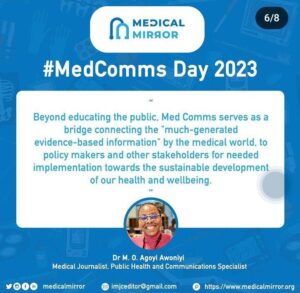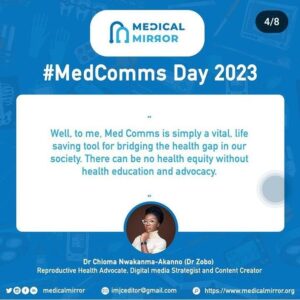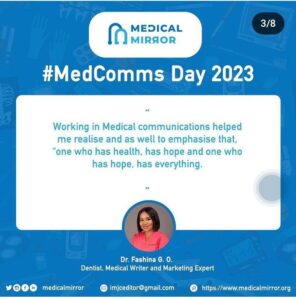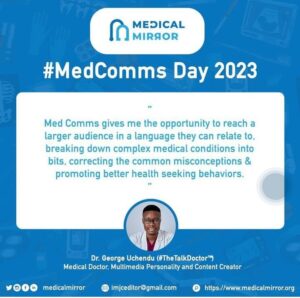Managing Editor and Chief Communication Officer, Medical Mirror Mary Oluwakemisola Agoyi (MBBS, MSc PH) in this interview with Media Career Development Network speaks on medical journalism, health communication, the state of health in the country and the activities of her platform to encourage, motivate and enrich the society and medical professionals on the importance of effective cross-communication towards achieving good health and wellbeing for all.
Congratulations on the Medical Communication Day your organisation marked recently. What is it about and what are the highlights of this year’s celebration?
The Medical Communication Day (shortly called the #MedComms Day) celebration was started in 2012 by a group of medcomms networking initiatives in the United Kingdom. The aim has always been to connect and bring together medical writers, editors and communicators across the health and pharma industry, globally, to share innovative practices, regulatory issues and other new developments within the field.
Over the decade, specific organisations have marked this day in their way (via virtual and physical events). But in Nigeria and Africa at large, Medical Mirror continues to commemorate the day by raising awareness about the existence and importance of medical communication and medical communicators – because of the abysmal knowledge surrounding this among the general populace and the medical practitioners themselves.

What informed the establishment of Medical Mirror?
The medical sector – and the health industry at large – is an important asset of any society. Unfortunately, the Nigerian health sector has enormous challenges, strains and constraints besieging it. This can be attributed to various factors such as underfunding, corruption and negligence of and within the sector itself.
However, despite these enormous challenges, vis-a-vis the impact media can afford, the health sector has a lower coverage in the mainstream media compared to its predicaments. This also can be attributed to the dynamics and the peculiarities of the sector which makes it difficult for those who do not understand the rudiments and technicalities of the medical profession and health sector to tell the medical stories.
And we know that if the stories are not told, the stories (including achievements, opportunities and challenges) cannot be heard. If these stories are not heard, the link to attract the necessary attention of both the citizens and the government to take necessary action is missing. Hence, the need to reveal and reflect the true image of happenings within the medical and health sector without “bias, prejudice, fears or favour” informed our establishment, as well as the need to have a society that is well informed about their well-being and that of the medical professionals.

How well would you say you have achieved your Vision, Motto, Mantra, and Mission?
Concerning our guides which include our vision, motto, mantra and mission, I believe we are on track. Trying our best with the limited resources available and accessible, in the type of environment we find ourselves in today. Also, with a vibrant team and in partnership with other medical organisations, we hope to achieve more.
Our guides:
- Vision – To see a redefined and working health sector that is trusted, efficient and available to all
- Motto – Telling the medical stories
- Mantra – Uncovering the ills, celebrating the achievements
- Mission – Utilizing the tools of journalism to foster transparency, accountability and development in the medical sector

What’s the difference between Medical Journalism and Health Journalism?
Just like the medical sector is a subset of the general health sector, medical journalism is a specialised arm or aspect of health journalism and both would usually intertwine. For instance, health journalism is broadly about gathering, synthesizing and sharing information on preventive and curative care at all levels of healthcare to the public. But medical journalism – as a subspecialty or niche – explores and extends deeper into the core medical practice and happenings within the medical profession, that ordinarily, people in that space might not understand or be privy to. Medical journalism helps to simplify occurrences, findings, and impact from the medical field (including medical research, scientific articles, technical documents etc.), and relate it to the public in a way they can comprehend, follow and implement needed actions.
What is your assessment of health reporting in Nigeria?
Health reporting in Nigeria – like every other – has its ups and downs. But in the real sense of it, my current assessment is that it’s mid-developed, under-represented, and seemingly under-rewarded. For example, reporters can’t go too deep into unravelling certain issues in the health sector such as misappropriation of funds, as they might be crossing their limits and professional lines.
Although, there have been some improvements in reporting for endemic diseases like malaria, HIV/AIDS, maternal and child health, but this is mostly limited to urban areas, with a large gap in appropriate health information in the rural areas. Also, there has been more media coverage both in print and on social media in recent times – which has brought more awareness and raised advocacy. Still, a lot more needs to be done to get more people and stakeholders informed about the need and care for good health and well-being of the population.
Likewise, other issues with health reporting stemming from the many unregulated media platforms – especially social media pages – cause the circulation of numerous false information about health topics and myths, which could be potentially harmful to people’s health and wellbeing.
What are your suggestions for improvement?
Some suggestions for improvement would include:
- Training and capacity-building workshops for health journalists and other interested personnel
- Creating robust health information systems for better, accurate and effective databases for reporting e.g., an anonymous pool to provide confidentiality and protect people’s identities from victimization.
- Collaboration with all healthcare professionals and organisations to get timely and first-hand medical and health information.
- Efficient fact-checking and verification of health data and information.
- Increasing rural coverage by more outreach and advocacy programs.
- Harnessing government support and raising more public awareness.
- Encouraging the general public and health professionals to share vital information i.e. We should all emulate the “see it, say it and sort it!” approach.

As a medical professional, how would you describe the state of health in Nigeria?
Dire. The state of health in Nigeria has been a case of “palliatively managing cancer”. It seems quality healthcare is either unavailable or unaffordable for the average Nigerian, especially in cases of chronic diseases or sudden onset of illnesses.
With the dwindling economy, it has become worse. Not only has this driven doctors and other health professionals out of the country, but it has also reduced the financial capability of patients to pay for care.
Coincidentally, a quote by the immediate past Nigerian Medical Association (NMA) president confirmed that the ratio of doctors to patients in Nigeria as of 2022 was 1:30,000 and in the north it is worse as the figure stood at 1:45,000. Not to talk about the lack and scarcity of healthcare facilities and equipment for our ever-expanding population.
However, there are some glimmers of hope, as some notable private hospitals have started turning the tide on healthcare and medical tourism in the nation. But this begs the question of how many people can afford such expensive healthcare services with the present economic realities…?
Hence, the state has to be improved, with more financing, better structuring and impenetrable monitoring and evaluation system. Also, adapting discoveries – inclusive of new technology with the know-how and information needed to make it work effectively and efficiently – can give us a better shot at relatively good health as a nation.
What issues should the government pay more attention to in the health sector?
- Improving infrastructure and service delivery efficiency in existing healthcare facilities. For instance, in some federal tertiary institutions, hospital beds are not properly cared for and infection control is visibly poor. On different occasions, while in the care of “leading” teaching hospitals, we witness the occurrence of statements like “may Nigeria not happen to us” or “Nigeria happening” to patients and even health care providers – in terms of basis amenities and equipment’s not working, e.g. ventilation not functional during surgery, lack of electricity and running water to carry out procedures, procuring fake medications and so on, leading to preventable loss of lives – which shouldn’t be so.
Another aspect is the provision of basic infrastructure such as conducive shelters for patients’ relatives while caring for their relatives on admission, especially at tertiary centres. The way these patients’ relatives are treated or survive at these centres – during those trying times – is berating and a sore sight. We need to take into consideration that patients’ relatives are important to the overall care and outcome of patients, and hence, must be catered to as well. Perhaps, the government can look into building shelters for patients’ relatives.
- Addressing brain drain through funding of health workforce development, training and providing medical practitioners with the resources needed to thrive.
- Increasing universal healthcare access by increasing the number of well-equipped primary, secondary and tertiary health centres, especially in under-served, hard-to-reach and deprived areas.
- Placing more focus on reducing Maternal and Child Health mortality, which are strong indicators of national health performance and the global health index.
- Strengthening infectious Disease Control surveillance, incidence reporting and health information systems.
- Increasing healthcare financing and investments for health organisations and entrepreneurs.
- Ensuring a robust, affordable, accessible and efficient health insurance system for the general populace.

Any other thing you want to say about your publication and media focus?
As a medical journalism and health communication platform, we hope to continually make an effort, to encourage, motivate and enrich society and medical professionals on the importance of effective cross-communication towards achieving good health and wellbeing for all.
For more information contact:
Mary Oluwakemisola Agoyi (MBBS, MSc PH)
Managing Editor and Chief Communication Officer,
imjceditor@gmail.com

